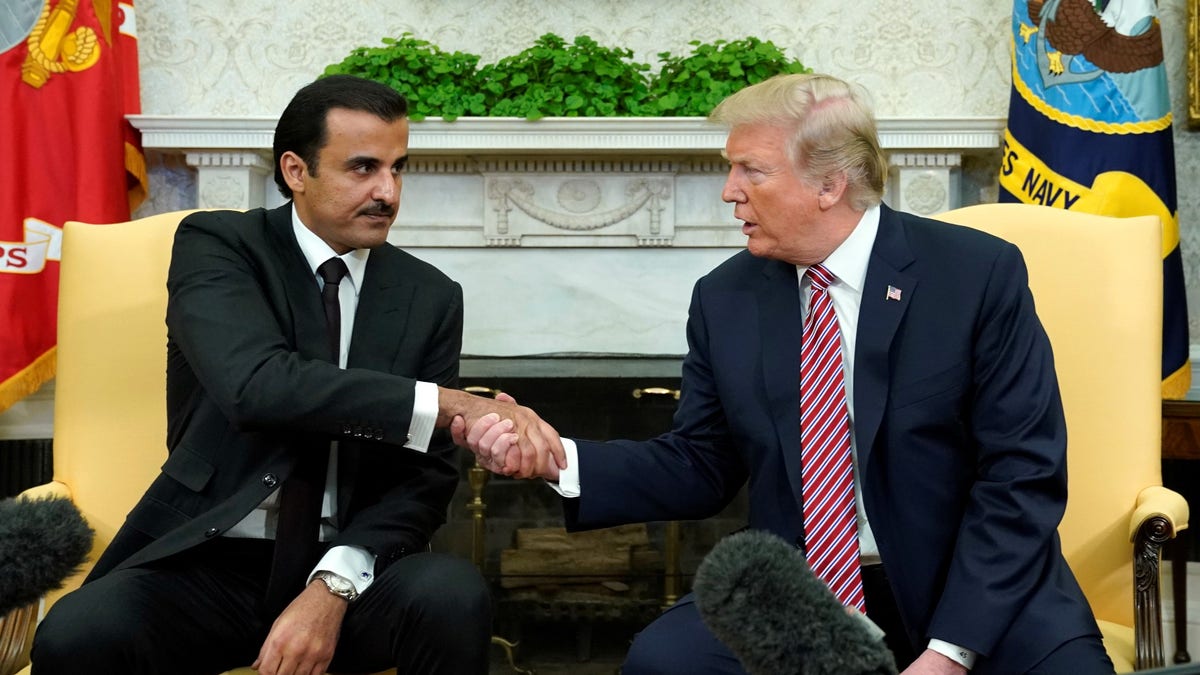
FILE -- President Donald Trump meets Qatar's Emir Sheikh Tamim bin Hamad al-Thani in the Oval Office at the White House in Washington, April 10, 2018. (REUTERS/Kevin Lamarque)
For nearly a year, U.S. efforts to fight terrorism and isolate Iran have been distracted by a family feud in the Middle East. Now there are encouraging signs that the family feud may be nearing an end, with the help of President Trump.
Last June, Saudi Arabia, the United Arab Emirates, Bahrain and Egypt cut land, air and sea links to the tiny Persian Gulf state Qatar, accusing it of sponsoring terrorism and upset by its Al-Jazeera news network, which they view as a disruptive force.
The embargo came only three weeks after President Trump met the leaders of the countries involved, in hopes of forging a united front against Iran.
The sudden blockade of Qatar has instead distracted everyone in the region. Both sides have spent millions of dollars in lobbying efforts, with the Qatar government winning support within the U.S. State Department for its denials of the terrorism allegations and pledges to improve efforts against suspected money laundering.
But the Saudis exercised their new influence inside the White House, prompting President Trump to denounce Qatar a “funder of terrorism” in a tweet.
Now the divided U.S. reaction to the Qatar distraction may be ending, and that could mean a path towards ending the dispute. President Trump hosted the emir of Qatar at the White House Tuesday and declared the emir a partner in the fight against terrorism.
“Those countries are stopping the funding of terrorism, and that includes UAE, and it includes Saudi Arabia, it includes Qatar and others,” the president said. “A lot of countries were funding terrorism and we’re stopping it.”
President Trump then told the emir: “You’ve now become a very big advocate, and we appreciate that.”
The emir didn’t accept the implication that Qatar was late to the table in opposing the funding of terrorism, saying: “We've been cooperating with the United States of America to stop funding terrorism around the region.”
But otherwise, the Qatar government will take President Trump’s words and run with them in its efforts to end the blockade of the country.
There is good reason for the U.S. to nudge or even push the players in the Qatar dispute toward a resolution. Qatar is of major strategic importance, having hosted the largest American air base outside the U.S. since 2003.
U.S. military officials tell me that keeping the base and maintaining good relations with Qatar are essential in keeping Iran at bay. The base has been invaluable in counterterrorism missions in Afghanistan, Iraq and Syria.
The Qataris also point out that they serve as a useful conduit for sensitive negotiations involving the U.S. It was the State Department that urged Qatar to allow the Taliban to open an office in the capital of Doha, so as to better facilitate negotiations over ending the 17-year-old war in Afghanistan.
Qatar also helped in liberating a U.S. hostage held by Al Qaeda’s Syrian affiliate, along with a Canadian hostage held by the Taliban.
In addition, Pentagon officials say the Qatari military is deeply involved in plans on how to combat extremist groups in the Middle East.
As for Iran, Qatar officials tell me it would be folly not to have good relations with a regional superpower only 170 miles away across the Persian Gulf, especially now that post-blockade much of Qatar’s fresh fruit, vegetables and consumer goods come from Iran.
Joshua Getzler, the senior director for counterterrorism at the National Security Council until 2017, noted in The Atlantic magazine last year that: “None of this is intended to suggest that Qatar is a perfect counterterrorism partner…. But few counterterrorism partners are perfect. To the contrary, many partners tolerate certain extremist groups even as they help the United States address the threats posed by others.”
Here’s hoping that the new thaw between the U.S. and Qatar will convince all the players in the region to end the blockade dispute. Then perhaps they could back to Square One – the point a year ago when President Trump was trying to knit together an effective coalition to block Iran’s ambitions.
